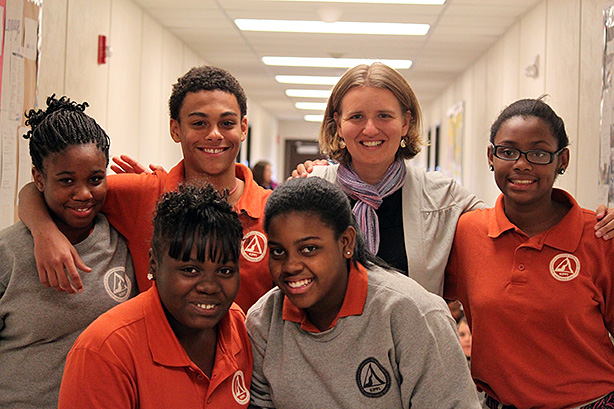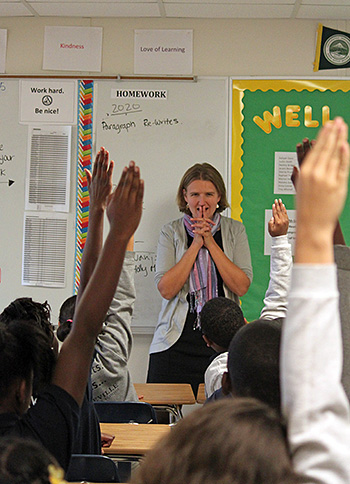
Maisie Wright '06 (top row, second from right) with students at the KIPP Blytheville school she started in Blytheville, Arkansas. Photo: Provided.
Africana alumna starts charter school in Arkansas
Kids like John Ball -- an eighth-grader at a public charter school in Blytheville, Arkansas -- help Maisie Wright '06 know she has the right job.

Wright with students at KIPP Blytheville in Blytheville, Arkansas. Photo: Provided.
"I remember sitting on the couch with John and his mom, telling them that John should go to college, that he was focused and a hard worker," says Wright, who helped found the school. "John told me that no one had ever said that to him before, that no one ever thought that could happen."
Wright, who majored in Africana studies and anthropology at Cornell, is the school director at KIPP (Knowledge Is Power Program) Blytheville, one of 141 KIPP schools in 20 states and the District of Columbia serving 50,000 students, mostly from low-income families. Before starting KIPP Blytheville in 2010, Wright worked at another KIPP school in Helena, Arkansas, through the Teach for America program.
"I saw the impact our school had in Helena and I wanted to branch out," she says about the challenge of starting the new school. The 280 students in her school learn in modular buildings that lie on what used to be a soybean field, but next year construction will continue on an adjacent campus with enough space for a pre-K through 12th-grade program.
Wright says she knew she wanted to teach from the time she was a freshman, but her experiences with the Cornell branch of the national "Let's Get Ready" program as a sophomore and junior cemented that thought. Through the program, she worked with students at Ithaca High School, helping them with college tests and applications.
"When I applied for Teach for America, I heard a lot about the needs in the South," she says. "Lots of people said, 'Why would you want to go there?' and that's exactly why I wanted to go there."
Wright's school is purposely located in the middle of a low-income neighborhood where a majority of the students are African-American. She knows she is fighting the statistics -- children in more affluent communities are seven times more likely to graduate from college than children growing up in poverty; only 8 percent of African-American students graduate from college in Arkansas.
"We want our school to be a place where kids have fun and love to learn, a place that prepares kids to make the best choices about where to go to college," she says. "As much as we focus on hard work and getting ready for life beyond school, we also want school to be a place where they're happy and where there's joy."
Wright says her experiences in Cornell classrooms prepared her well for some of the challenges she has faced as an educator.
"My professors set incredibly high expectations for me," she says. "I did things I never thought I would have been able to do."
Wright said she chose Cornell after seeing the incredible array of courses she could take. "I ended up taking classes all over the place in every school," she recalls.
Her outside-the-classroom experiences with a diverse group of Cornell friends now help her in a place where she's the minority.
"I am a white girl from Vermont asking parents to sign up for a school they know nothing about," she says. "It's so important to come with a sense of humility and earn people's respect.
"They see how hard I work for our kids and where my heart is. Our parents just want something better for their kids."
Wright says she'll feel fulfilled when one of her students graduates from Cornell.
"I know how lucky I was to get such a quality education at Cornell," she says. "I want that for all of our kids."
Kathy Hovis is a writer for the College of Arts and Sciences.